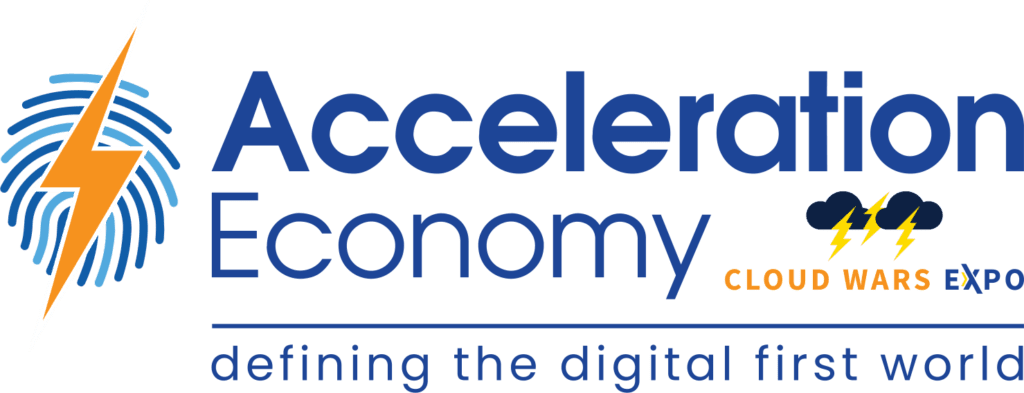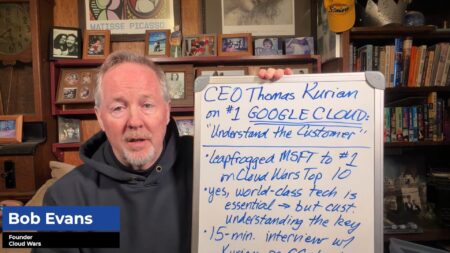CXOs are under immense pressure to drive growth in today’s digital-first, dynamic marketplace. B2B buyers, consumers, go-to-market partners, and employees are digital — not will be or might be. As such, they have lofty expectations for instant access, frictionless experiences, and value-added options beyond the product(s) you offer. Digital is at the core of customer relationships and company revenue.
Marc Benioff, founder, chair, and CEO of Salesforce, sums up the need for an all-in digital approach this way:
“I’ve been on more sales calls with more CEOs in the last two months than at any other time in my career. There’s universal agreement among CEOs that digital transformation, while it isn’t a one app solution, it’s a must have. Organizations, boards, and governments around the world have a digital transformation imperative like never before. Many of them are accelerating their plans for a digital-first, do-business, work-from-anywhere environment.”
With this current reality, Boards of Directors (BoDs) do not have the greatest reputation for being digital-first strategists or for having deep digital transformation experience. Most board members are savvy business pros who may approach digital as a project versus a foundational, forever business shift. It’s understandable. However, digital transformation is a wholesale company change that requires massive business reinvention and a daily ongoing company-wide commitment to business agility.
“Think of digital transformation less as a technology project to be finished than as a state of perpetual agility, always ready to evolve for whatever customers want next, and you’ll be pointed down the right path.”
Amit Zavery, VP and Head of Platform, Google Cloud
CXOs Mandate to Prepare and Involve Boards in the Company’s Digital Agenda
The most successful digital transformation CXOs take a proactive approach to get their board members involved early and often. These leaders create a purposeful board-level plan to enable immediate change while setting the company up to compete for the mid- to long-term.
Digital transformation happens not just internally, but externally, which means that board members are invaluable for making connections, opening doors, and providing access to the right resources to re-invent supply chains, create digital ecosystems, and develop go-to-market partnerships, to name a few.
The BoD View: Roles Board Members Must Play in Digital Transformation
With this as our business landscape, let’s look at the roles board members can play in digital business transformation and break down the areas CXOs are putting their board members to work.
Company Strategy, Mission, and Culture
Challenging how the business creates value is one of the most valuable roles BoDs can play. Impactful board members empower the CXO leadership to challenge strategy and foundational issues, such as “What business do we really need to be in today and tomorrow?”
Board members should be counted on to bring in outside voices, make introductions, and tour companies in other industries to shape digital strategy, inspire ideas, and identify essential change drivers for digital acceleration.
Capitalization for Short- and Long-Term Success
BoDs are comprised of savvy leaders who can focus on crafting financial plans to raise capital, reallocate cash flow, and look at acquiring and selling off businesses that don’t or won’t align with today’s digital-first world. Because it’s easy for CXOs to focus on short-term results when digital is a long game, board members can bring discipline to executing evolved financial and economic models.
Technology and Data as a Transformational Driver
At the board level, technology is often an efficiency conversation about cost management. With digital transformation, CXOs and board members can work together to focus on technology and data investment as a business growth and innovation driver. Recent McKinsey research on cloud ROI, for example, has shown that as much as 75 percent of the $1 trillion at stake in cloud technology will come from business innovation.
Hiring and Developing Digital Talent
Board members can recruit talent from digital native businesses and from organizations that have been through digital transformation. Savvy boards identify board members to shape a strategy for hiring and developing “digital DNA” across the company in all functions.
Bringing Outside Expertise to the Business
Board members know other board members, investors, and CXOs who have gone through or are going through digital transformation. Members should tap into this expertise to bring in outside voices to both inspire and provide insights on the digital transformation journey.
Professional CXO Coach and Therapist
Being an executive coach is one of the most valuable roles board members can play. Board members can drive CXOs to aim higher and to stay focused on going after the biggest opportunity to meet today’s changing customer needs and market opportunities.
I will be moderating a deep dive into the Digital Transformation CXO-Board relationship June 28 at Cloud Wars Expo in San Francisco. An interactive panel with Acceleration Economy analysts and CXOs – Tony Uphoff, Wayne Sadin, and Gayle Keller – will be debating and discussing how to optimize this relationship to drive digital business.
The CXO View: Getting Your Board Onboard and Digital Business Proficient
Tony Uphoff, a fellow Acceleration Economy analyst who will also be part of the CXO & Board Digital Transformation panel at our upcoming Cloud Wars Expo, recently shared his digital transformation imperatives. As a four-time CEO, board member, and operating executive who has navigated and built digital businesses, his digital transformation advice is as follows:
Lead With the “Why”, Then the “How”
CXOs often assume board members understand the incredible energy and resources digital transformation requires to be successful. Uphoff advises CXOs to take a half-step back to align on the “why” digital matters and the ongoing requirement to compete as a digital business.
With alignment on the mission, leaders can dive into the “how” and define the initiatives to accelerate the company’s digital journey. This approach naturally creates clear milestones and progress metrics for board-CXO alignment and accountability.
Show What Digital Transformation Looks Like
Uphoff points out the importance of bringing to life the digital transformation initiatives that require funding. He advises bringing in functional leaders to share digital initiatives, the impact on their day-to-day roles, and the short- and long-term impact on the business.
For example, a CMO can showcase an evolved go-to-market strategy to bring a digital subscription-based offering to existing customers. Another example is a CIO highlighting a cloud migration initiative to provide customer and partner access to self-serve applications and resources creating new revenue streams.
These specific types of initiatives can be tracked against digital transformation goals and the details shared along the journey to build confidence and buy-in.
Apply Board Member Check-Ins to Pulse Buy-In and Value
In Uphoff’s experience, it is important to proactively ask for strategic input on a board member’s core areas of expertise and to actively drive a specific digital business. For instance, if a board member is a former CFO, they need to be focused on the financial models, the margin gain opportunities, and the capitalization plan, so make sure to connect with them on those areas.
Understand Board Risk Tolerance to Shape the Plan and Metrics.
One overlooked element on the digital transformation agenda that Uphoff points out is assessing individual and collective board members’ appetite for risk. Bringing in outside experts and other CXOs who are going through digital transformation can help amplify the cost of not transforming versus the urgency to act now to create business impact.
The CXO-Board Partnership to Drive Digital Transformation
Digital transformation is an always-on, all-in change that is never finished. With the right level of board support and enthusiasm, the transformation will go much smoother and is set up for short-, mid-, and long-term success. Without board support, be prepared to spend much of your time distracted and frustrated because you are constantly rationalizing. At Acceleration Economy, we vote for the former!
Want to gain more insights from Cloud Wars Expo?
Starting on July 20th, more than 40 hours of on-demand cloud education content will be available for free to Acceleration Economy Subscribers.











